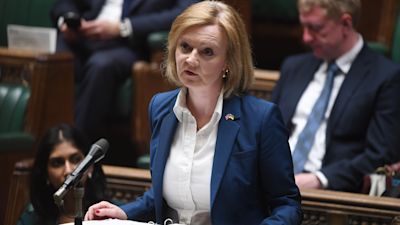EU threatens to retaliate with 'all measures at its disposal' if UK scraps Northern Ireland Protocol

The EU said it is willing to talk but warned the threat of unilateral action is damaging trust, as Anushka Asthana reports
A trade war could erupt between the European Union and UK after the bloc threatened retaliation over British plans to override a post-Brexit treaty.
Foreign Secretary Liz Truss announced plans to table legislation which would allow ministers to rip up the Northern Ireland Protocol amid concerns that it's created economic barriers and has caused an impasse on efforts to form a Stormont government.
The Protocol is an agreement between the UK and EU which ensures no hard border on the island of Ireland but places checks on trade flowing from Great Britain to Northern Ireland.
Unionists are unhappy with the agreement as they feel it cuts them off from the rest of the UK.
Ms Truss said the Protocol is putting the Good Friday peace agreement "under strain" because it is not supported by the unionists in Northern Ireland and is place "onerous" restrictions on businesses seeking to receive products from Great Britain.
"Without resolving these and other issues we will not be able to re-establish the executive and preserve the hard-won progress sustained by the Belfast-Good Friday Agreement. We need to restore the balance in the agreement," she told MPs.
But European Commission Vice-President Maros Sefcovic said he had "significant concerns" about the plan, cautioning that "unilateral actions are not acceptable".
He warned that the EU will "respond with all measures at its disposal" if the UK moves ahead with the Bill.
There are fears this could result in the trade war between the UK and the EU.
He added: "With political will and commitment, practical issues arising from the implementation of the protocol in Northern Ireland can be resolved. The European Commission stands ready to continue playing its part, as it has from the outset."
Boris Johnson has insisted he does not want to "scrap" the Protocol, and believes it can be "fixed" after meeting political leaders in Northern Ireland on Monday.
"Let's fix it - we don't want to nix it, we want to fix it and we want to work with our EU partners to do it," he said while speaking to broadcasters at the opening of the new Elizabeth Line in London.
Ireland's Foreign Affairs Minister Simon Coveney said the unilateral action from the UK was "damaging to trust".
"At a time when people in Northern Ireland have chosen their elected representatives and want to get the Executive back up and running, the path chosen by the British government is of great concern," he said.
But Prime Minister Johnson insisted problems with the protocol must be addressed.
On a visit to Paddington station in west London, he said: "What that actually involves is getting rid of some relatively minor barriers to trade.
"I think there are good, common sense, pragmatic solutions. We need to work with our EU friends to achieve that."
Ms Truss insisted the legislation will include "new measures" to protect the EU single market, including "robust penalties" for those who seek to "abuse the new system".
The government says the legislation is an insurance policy in case negotiations with the European Union on the Protocol do not find a solution.
Ms Truss told MPs the legislation would seek to reform the Protocol and "our preference is to reach a negotiated outcome with the EU and we have worked tirelessly to that end and will continue to do so".
The legislation is not being tabled now but it is understood the government aims to do so before summer recess, however, negotiations with the EU on the Protocol will continue in the meantime.
Ms Truss said the legislation would be consistent with the UK's international obligations and would not see it break international law.
She added that it will "cement" the bits of the Protocol that are working, such as the Common Travel Area, "while fixing" the aspects which are causing issues.
The EU insists that checks are necessary on some trade flowing east to west to protect the integrity of the Union's single market, but the DUP and UK government say it has created economic barriers for Northern Ireland.
The DUP is refusing to enter government with Sinn Féin over the contentious agreement, with the unionist party saying it is causing instability in Northern Ireland due to checks on trade which are hindering the country's ability to access certain products.
But a majority of elected politicians in Stormont's new Assembly represent parties that support retaining the protocol, with many arguing that the arrangement offers the region protection from some of the negative economic consequences of Brexit.
They also point to the unfettered access Northern Ireland traders have to sell into the EU single market as a key benefit of the protocol.
A Foreign Office source said Ms Truss' priority is to uphold the Good Friday Agreement and denied she is trying to "pick a fight" with Brussels.
The Good Friday Agreement, a treaty which has helped ensure peace in Northern Ireland, was signed with an understanding that NI would remain part of the UK unless a majority on both sides of the border agreed.
Want a quick and expert briefing on the biggest news stories? Listen to our latest podcasts to find out What You Need To know...
Critics of the Protocol say it has changed Northern Ireland's constitutional position within the UK because it effectively places a border within the Irish Sea but not on the island of Ireland.
The European Commission has urged Britain to enter talks about the bloc's proposals on the protocol as a "much better course than engaging unilaterally".
Daniel Ferrie, a commission spokesperson, told reporters in Brussels that the EU package offered during negations in October were "not a 'take it or leave it"' offer.